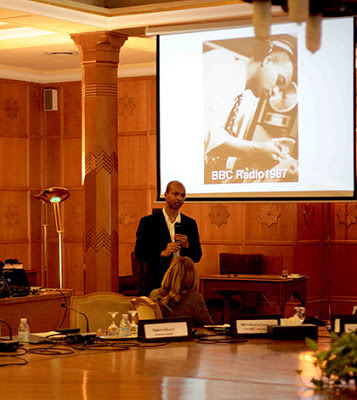 |
| David speaking at Arab league Conference in Cairo |
'I'm a video journalist, how can I learn more?' This is often followed by a swift move to retrieve your email, for presumably later discussions.
Questions like this are not uncommon, but they're loaded. What my good delegate friend means, is how can I make stories like you.
On the panel opposite me, another delegate rolled her eyes as to say 'Insha Allah'. She continued: Mr David, when you were here five years ago, you were talking about video journalism, and I was thinking how can we learn this, now you're talking cinema journalism, and I'm thinking the same thing.
There was a chuckle from everyone else. The implications being, yep, if you want to stay ahead of the maddening crowd you need to step up.
I love a creative fight club!
Attendants at News Rewired 2010 will remember too me saying lets have a creative fisty cuffs, because only then can we begin to sort out, by the powers of rhetoric, what this thing means.
If you'd read Moses-knows how many books from my research, a fraction of which I turned into this banal art work below, you'd want to be challenged.
 |
| Sample of books I studied. I'll supply a lis in due course |
In Cairo, at the Arab league of Nations conference, the more pressing problem mirrors the state of the country's politics. Everything is in transition.
If the BBC had Cairo as its place of abode, it would have a field day. The stories and issues fall about you. You're only literally a stones throw away from tripping up on some other issue.
Yesterday, the Egypt Gazette reported President Mossi appointing a friend, a dentist, as his new IT specialist. Dentists are very clever, yes, but you wouldn't bet on router issues and the intricacies of transmission frequencies figuring in their muffled debates with patients.
Hello Mrs Rabia. Drill at the ready, I'll be over to fix your download speeds afterwards.
No, what's really eating at Cairo is the amount of people who are publishing, and in so doing wanting to be credible, but engaged in internecine journalism. In part it's about the dash for dollars, who publishes first and fast wins, never mind whether they're wrong, its out there.
Secondly, it's an ideological battle, with no sense that the poor lot caught in the middle are citizens who gulp down facts, rumours and figures, without the wherewithal from the professionals to help them distinguish fact from fiction.
Meanwhile tourism has tanked and the nation is slipping into abject ruin. Oh dear!
If the West, through its sheer willfulness could beat its chest about the benefits of citizen journalism, in Cairo, they're beating their heads. Too much can be a bad thing.
There's no sense of credibility. This isn't about the tools, it's about the attitude. As I said yesterday, what's needed is a social change.
If you don't know your objectivity from your subjectivity, why being partial is perhaps far worse than balance, how being balanced can level the scales, but it doesn't have to be "he said, she said', and that at the heart of all this is a fairness, truthfulness, integrity that you wear in your heart, it's time you found a credible journalism school.
Me, I have done that, but I also believe the experience of the many years working in mainstream, BBC and Channel 4 News, has conditioned me, so that even when I do cinema journalism, I can defend a subjectivity to eke out the story.
The pic at the top was taken when I was working in BBC Radio way back in 1987. Provenance I told another speaker, provenance.
Subjectivity, actually correspondents to this all the while, as I said to Cairo's new Sweden correspondent. Trust, is something that is earned. There's work to be done, and truthfully, what makes it exciting and both alarming, is
- Those statues which were laid down to combat yellow journalism apply.
- But, there are local nuances that redefine the philosophy of any journalism.
Take the concept of the vox pop. Both a brilliant filler, but a barometer during the blitz for how individuals felt. Their experience mattered. It's now a feature of many a reports. At best it provides a credibility for the network being in touch with audiences, at worst it amplifies or deadens an issue, because of
- The notion of balance
- The reporter picking anything
If you follow Schudson's notion that journalism is a cultural construct, and it is by the way, the vox pop to individuals might be better fashioned as the the 'vox pop familia'. It's when you interview families, the patriarchal, and matriarchal and siblings that you come away with not only good sots, but the tensions or harmonies in households - a reflection of Egypt.
In the West the family bears a huge brunt of being dysfunctional or safe. Not in Egypt, though western values are reeking change on this nucleus.
Someone who looked at the family well in his featured piece was Inigo Gilmore for Channel 4 News. Gigi is battling her sister, whilst their auntie (I think) exasperated asks why can't everyone just stop this nonsense. In my own film Tahrir Memento Sara talks about the revolution in her household and how her dad now asks her opinion.
As the youngest that's uncommon, but Sara fought a good campaigning fight during the 18 days revolution and was recognised for doing so.
The old trusted hegemonic ways of journalism create interesting tensions in these regions. Cinema Journalism may just compound that, but they're willing to give it a go. I have been invited back to Lebanon and Egypt later in the year.
Time to get really ambitious. There's amazing stories to be told.
For more go to Viewmagazine.tv
I'll post some new films shortly.